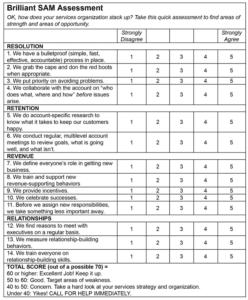Success once amassed, Seldom does last;
But do not lay blame, Just ramp up your game,
Your brilliance will be unsurpassed.
Frontline services professionals whatever their title (field services engineers, customer success managers, technical account managers, services account managers, project managers, professional services consultants, support engineers, designated engineers, remote engineers, and more) have always been important assets for all organizations selling and delivering products and services. However, as customers have become more sophisticated, and products and services have become more complex, and the solutions delivered have greater impact, just being good is no longer good enough. To drive success, customer-facing personnel must now acquire more and better skills and embrace a different mindset to meet the growing needs, wants, and expectations of sophisticated customers. They need to think and act like brilliant strategic account managers.
My research and experience[1] confirm that the very best frontline pros are masters of delivering on the 4 R’s: Resolution, Retention, Revenue, and Relationships. Read on to learn best practices and to take an assessment to compare yourself or your services organization to top performers.
Resolution
The role of the services professional was originally created to resolve problems early, reacting quickly to minimize the time and the negative consequences of important products and services not working as required. This has not changed; customers still highly value having one individual to take ownership when things go south. Yet, everyone knows the value of avoiding problems before they occur, and this proactive component is becoming a much greater area of focus. So, resolution is about both solving customer problems early and avoiding problems in the first place.
Here are the best practices related to resolution:
- Collaborate within your services teams as well as with the sales team and possibly other groups on “who does what, when and how” to put a bulletproof (simple, fast, effective, accountable) process in place.
- Grab the cape and don the red boots when appropriate, to solve customer problems before they detonate.
- Put priority on avoiding problems.
- Partner with your customer from day one, predicting probable problems and agreeing what you will do and what the customer will do.
Retention
The natural result and the main success metric of the services team is retention—keeping that hard-earned business. In most cases, creating loyal accounts and keeping 95% of targeted key accounts are realistic objectives.
Here are the Brilliant SAM best practices related to retention:
- Do resolution really well.
- Do account-specific research to know what it takes to keep them happy.
- Conduct regular, multilevel account meetings to review goals, what is going well, and what isn’t.
Revenue
As the role of services customer-facing personnel has changed from being reactive to proactive, top organizations know that gaining new streams of profitable revenue is a natural outcome of an effective strategic account management program. Actively finding new opportunities and supporting getting more business is now a standard expectation of brilliant SAMs. Here are the best practices related to revenue:
- Do resolution really well.
- Do retention really well.
- Define everyone’s role in getting new business.[2]
- Train and support new behaviors.
- Provide incentives.
- Celebrate successes.
- Before you giveth, taketh away.[3]
Relationships
Today’s high-performing brilliant SAM is all about relationships, both within the customer’s organization and within their own organization. Strong relationship skills build deep and wide trust within the customer and also with key stakeholders inside your company. The value to the business is blocking out competition.
Here are the Brilliant SAM best practices related to relationships:
- Do resolution really well.
- Do retention really well.
- Do revenue really well.
- Find reasons to meet with executives (inside and outside) on a regular basis.
- Measure relationship-building performance.
- Train, coach, and reward relationship-building behaviors.

Leave a Comment